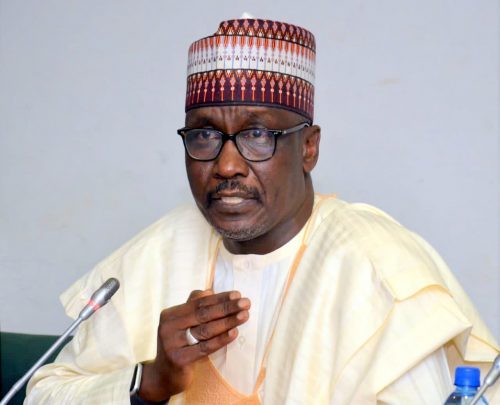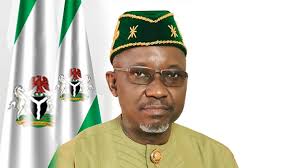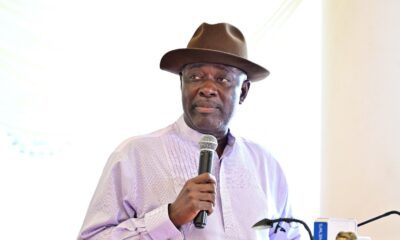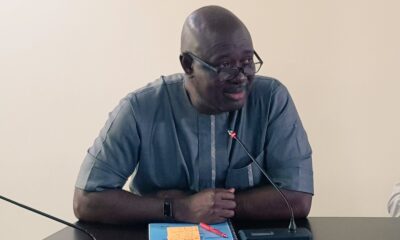Energy
No int’l oil firm left Nigeria — Minister, Oil

The Federal Government has said that none of the International Oil Companies (IOCs) doing business in Nigeria has left as being insinuated.
Minister of State for Petroleum Resources (Oil), Heineken Lokpobiri, gave the clarifications during the inauguration of the ongoing Nigeria International Energy Summit (NIES 2024), at the Presidential Banquet Hall in Abuja.
Lokpobiri dismissed the report, adding that the IOCs only shifted their portfolio and investments to offshore.
“I want to use this opportunity to assure everyone that no IOC is leaving Nigeria. They are only going deep offshore,” he said.
The minister said that the divestments by some of the oil companies would benefit the country, as the IOCs would be making further investments in the deep offshore.
The investments, according to Lokpobiri, will create room for indigenous companies to develop capacity within the onshore and shallow waters space.
“It is imperative to note that we are strategically managing the divestment processes.
“Our commitment to enhancing our crude oil reserves and production is unwavering, and we are actively exploring innovative solutions to attract investment, optimise operations and foster sustainable growth.
“We are open for business and ready to welcome your investments,” he said.
According to Lokpobiri, the transition to cleaner and more sustainable energy sources in the country is inevitable.
“We are actively pursuing initiatives to position Nigeria as a leader in this energy transition.
“As we navigate this change, Nigeria recognises the need to strike a balance between meeting our growing energy demand and reducing our carbon footprint.
“The diversification of our energy mix, investments in renewable energy and the adoption of cleaner technologies are all integral components of our strategy,” he added.
The Minister explained that investments in Nigeria’s oil and gas industry declined by 69 per cent compared to the 28 per cent global average between 2017 to 2022.
“To further buttress the above, the capital investment to reserve ratio shows the amount of capital deployed to a country’s available reserves.
“Nigeria has an abysmal capital investment-to-reserve ratio of five per cent compared to Angola with 46 percent; Brazil – 115 percent; Mozambique – 92 percent and Guyana – 617 percent.
“The window for attracting new investments and exploring our vast reserves is fast narrowing; if the global energy transition accelerates, approximately 60 percent of Nigeria’s reserves could be uncompetitive to produce.
“Against this backdrop, we have identified that there are so many licenses with proven reserves that are not being optimised in the hands of IOCs, NOCs, and others.
“In line with Mr President’s Renewed Hope agenda, we are working on changing this narrative,” he said.
Also speaking, Group Chief Executive Officer (GCEO), NNPC Ltd., Malam Mele Kyari assured that its role in the divestment of the IOCs from onshore and shallow water assets in the country, would serve as a facilitator and not an obstacle.
Kyari said that by virtue of its statutory mandate as the enabler of national energy security, NNPC Ltd.’s role would ensure optimal and sustainable production from the divested assets to guarantee energy security for the benefit of Nigerians.
He reiterated the company’s willingness to invest in the proposed African Energy Bank as a way of ensuring sustainable funding for energy projects in Africa, to guarantee energy security.
On investment in energy infrastructure to drive energy security, Kyari further said that the completion of the Obiafu-Obrikom-Oben Pipeline was in sight as the tunnelling across the River Niger was currently ongoing.
He assured stakeholders of the company’s commitment to work with them to close the energy deficit gap and create prosperity for Nigerians.
The NNPC helmsman said that from all indications, all issues of energy scarcity in the country would be over in the next 10 years.
The event saw the participation of key industry and governmental figures, including Haitham Al-Ghais, Secretary-General of OPEC and Omar Farouk Ibrahim, Secretary-General of the African Petroleum Producers’ Organisation, among others.
Energy
Oil inches upward following report surrounding the death of Iran’s president


Oil prices saw a slight increase on Monday following report surrounding the death of Iran’s President Ebrahim Raisi, his foreign minister and others in a helicopter crash. The development is seen to have contributed to the overall market sentiment, which also included last week’s gains.
Brent oil futures for July saw a 0.3 percent rise, reaching $84.19 a barrel, while West Texas Intermediate (WTI) crude futures experienced a 0.2 percent increase, trading at $79.70 a barrel.
In a tragic turn of events, a helicopter carrying Iranian President Ebrahim Raisi and Foreign Minister Hossein Amirabdollahian crashed over the weekend in the mountainous terrain of northwestern Iran, with both leaders report dead. The loss of President Raisi comes at a time of heightened tensions between Iran and Israel, following a series of strikes exchanged earlier this year.
Prior to the report, crude oil prices had been experiencing an upward trend due to several key factors. Positive indicators such as the possibility of U.S. interest rate cuts and improving demand in China have contributed to this increase in appetite for crude.
Furthermore, the U.S. government’s announcement of its purchase of approximately 3.3 million barrels of oil to refill the strategic petroleum reserve has also bolstered market confidence. However, ongoing instability in the Middle East and its potential impact on oil supplies remains a significant concern, keeping Brent oil prices above the $80 mark for most of 2024.
As the week unfolds, oil markets are exercising caution in anticipation of crucial announcements regarding U.S. interest rates and the economy. The release of the Federal Reserve’s late-April minutes and speeches from several Fed officials would also be closely scrutinised for insights into potential policy shifts.
Additionally, the upcoming Organization of Petroleum Exporting Countries and allies (OPEC+) meeting on June 1st is expected to provide updates on the cartel’s plans to maintain ongoing production cuts, which could have a significant impact on global oil supplies.
Energy
NNPCL: 600 illegal refineries destroyed in two years – Kyari


The Group Chief Executive Officer of the Nigerian National Petroleum Company Limited, Mele Kyari, said the firm has destroyed over 600 illegal refineries in the last two years.
Kyari disclosed this during a stakeholder engagement between the Nigerian Association of Petroleum Explorationists and the NNPCL in Lagos, at the weekend.
He noted that the firm removed 5,800 illegal connections to Nigeria’s crude oil pipelines in the last two years.
According to him, the country is prospecting 1.7 million barrels per day in the coming months, up from April’s 1.28 mbpd.
The NNPCL boss also emphasised the need to fight insecurity in the oil and gas sector to increase production.
“How do you increase oil production? Remove the security challenges in our onshore assets. As we all know, the security challenge is real. It is not just about theft; it is about the availability of the infrastructure to deliver the volume to the market.
“No one will invest in oil production when he knows the production will not reach the market. Within the last two years, we have removed over 5,800 illegal connections from our pipelines and over 600 illegal refineries—cooking pots or whatever they were. You simply cannot get people to invest in it until you solve that problem,” he stated.
Energy
NDDC, Shell complete construction of Ogbia-Nembe road


The Niger Delta Development Commission (NDDC) and the Shell Petroleum Development Company (SPDC) have completed the construction of the 25.7-kilometre Ogbia-Nembe Road in Bayelsa State.
The road project is slated to be commissioned on Saturday, May 25, 2024.
Speaking during a joint inspection of the project by officials of the two organisations, the NDDC Managing Director, Dr Samuel Ogbuku, described the multi-billion-naira project as a legacy and flag-ship of intervention in the Niger Delta region.
Ogbuku said that the “star project,” with seven bridges, 53 culverts and 4 spurs, linking 14 communities, was a good example of what could be achieved through collaboration of development agencies.
He declared, “The Ogbia-Nembe road as a model in partnership, with emphasis on quality job delivery. We have redefined our standards to globally acceptable best practice and we will henceforth compel our contractors to abide by them.”
The NDDC boss said that the NDDC would be banking on multinational corporations such as Shell, Chevron, and others to collaborate with the Commission in executing legacy projects, noting, “The oil giants have what it takes to provide funding, technical assistance, and expertise in environmental management, community development and corporate social responsibility.”
“The SPDC has shown that in addition to its statutory obligation to contribute to the funding of the NDDC, it is also necessary to work with the Commission on specific impactful projects. I am sure that other International Oil Companies, IOCs, will feel challenged to toe the line of Shell to provide quality infrastructure for the people of the Niger Delta.”
Ogbuku said that NDDC was already in discussion with Chevron on forging a partnership for the construction of the Warri-Omadino-Escravos Road, in Warri North Local Government Area of Delta State.
He observed that the project, when completed, would link Warri to Escravos which is the hub of oil and gas activities in Warri, which was very important to the economy of Delta State and Nigeria at large.
The SPDC Corporate Relations Manager, West, Chief Ucheoma Amechi, said that as a company that attaches importance to quality job delivery in the execution of development projects, Shell was satisfied with what has been achieved at the Ogbia-Nembe Road. He gave kudos to the NDDC for doing a good job in the execution of the signature project.
The NDDC Director, Environmental Protection and Control, Engr Onuoha Obeka noted that the road, which cut through swampy terrain, encountered many challenges.
He observed, “We are happy that in spite of the challenges, the project connecting about 14 communities in the Ogbia-Nembe axis of Bayelsa State, has been completed. These communities were hitherto, not accessible by road. This is the first connection between them and the upland and it will boost the socio-economic fortunes of the people.”
Obeka said that the project was an opportunity for the NDDC engineering crew to improve their skills.
He noted, “The challenges we met here were unique, building a road in the mangrove swamp. You will notice that both sides of the road are filled with water. The road was actually built on a sand embankment of 2.5 million cubic metres of sand.”
He explained: “The road traverses the communities of Opume, Emekalakala, Akipelai, Sabatoru, Obiama, Etiama, Igbeta-Ewoama, Agbakabiriyai, Ekese, Iwokiri, Otatubo, Basambiri and Nembe, the project comprises seven bridges and 53 culverts. It also comprises a main alignment of 19.7 kilometres, Opume spur of 1.45 kilometres, Emakalakala spur of 2.685 kilometres, Akipelai spur of 850 metres and Ogbolomabiri spur of 1.05 kilometres.
The Area Manager for SETRACO, Engr. Joseph Cosme, assured the joint inspection team that the Commission had completed all the minor repairs on the road in preparation for the commissioning ceremony.
-
Finance4 months ago
Court orders Sen. Victor Umeh to repay N136m bank debt to AMCON
-



 Abuja Update3 months ago
Abuja Update3 months agoUNDP, FG partnership needed to achieve inclusion, equity- Minister
-
Abuja Update2 months ago
Banks drive stock market performance with N147bn gain
-
capital market2 years ago
Rt.briscoe, FBNH, Others halts negative performance of stock market
-
Submission Guidelines5 months ago
CALL FOR SUBMISSIONS: POETRY COLUMN-NND
-



 Health1 month ago
Health1 month agoCapacity training will reduce migration of health workers- NPHCDA
-



 Business4 weeks ago
Business4 weeks agoTingo Group unveils Tingo Electric, Tingo Cola drink at Lagos launch
-
News5 months ago
Oil thieves sponsoring malicious media campaign against Navy – Spokesman










